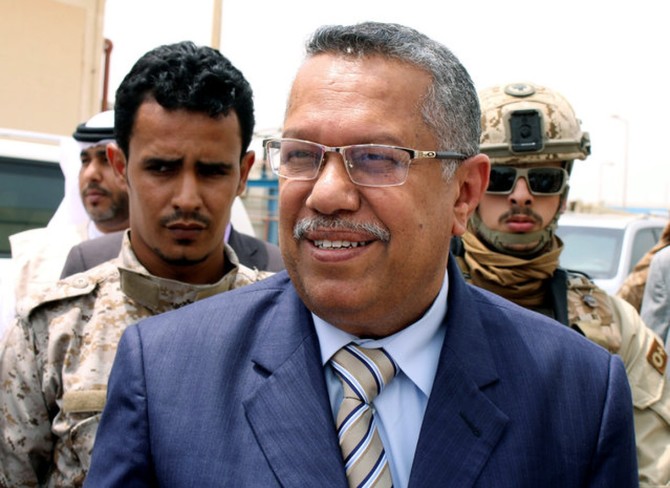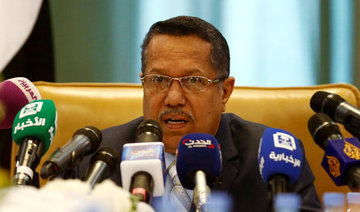SANAA, Yemen: Yemen’s Prime Minister Ahmed Obaid Bin Daghar was preparing to flee to Saudi Arabia on Tuesday after separatists backed by the United Arab Emirates seized the area around the presidential palace in the southern city of Aden in fierce battles, security officials said.
A Saudi-led coalition that includes the UAE has been battling rebels in northern Yemen for nearly three years on behalf of President Abed Rabbo Mansour Hadi’s government. But despite having a common enemy, the UAE and Hadi have been locked in a long-running power struggle, which boiled over on Sunday as clashes erupted across the government’s seat of power.
Elsewhere in Yemen, Al-Qaeda militants attacked a checkpoint in the southern Shabwa province, killing at least 12 soldiers in an area where Yemeni troops had claimed victory against the extremist group. The militants claimed the attack in a statement circulated on social media, saying it was in retaliation for abuses by US and UAE-backed forces.
The security officials said fighters loyal to the so-called Southern Transitional Council fought all way to the gates of the palace in central Aden, forcing Hadi’s troops to abandon their positions. The officials said Hadi’s prime minister and several Cabinet members would leave Yemen imminently for Riyadh, where Hadi is already based.
Saudi troops who have been guarding the palace for months stopped the separatists at the gate, preventing them from entering. A senior government official told The Associated Press that Prime Minister Ahmed Obaid Bin Daghar and several ministers remain inside. The official declined to say whether the prime minister was to leave Aden. All officials spoke on condition of anonymity under regulations.
In the northern district of Dar Saad, witnesses said coalition jets bombed a military camp of Hadi’s forces before separatists took control of it. Brig. Gen. Mahran Al-Qubati told the AP that his forces respected a cease-fire announced by the coalition earlier in the day but the separatists used the truce to attack his base using Emirati armored vehicles.
Col. Turki Al-Malki, the coalition spokesman, declined to comment on the bombing. “I am not able to discuss the details of an ongoing operation,” he told the AP.
The fighting had subsided by midday, when checkpoints run by both sides could be seen across the city.
The fighting in Aden erupted on Sunday, when a deadline issued by the separatists for the government to resign expired. Hadi, who has been in Saudi Arabia for most of the war, has described the separatists’ action as a “coup.” The violence has killed at least 36 people and wounded 185 since Sunday, according to the International Committee of the Red Cross.
It has also exposed deep divisions within the Saudi-led alliance against the Iran-backed rebels, known as Houthis, who control much of northern Yemen, including the capital, Sanaa. The war has been locked in a bloody stalemate for the last three years, with more than 10,000 people killed and some 2 million displaced by the fighting.
The UAE has viewed Hadi with suspicion because of his alliance with the Yemeni branch of the Muslim Brotherhood, a pan-Arab political movement that the Emirates and some other Arab states view as a terrorist organization. Over the past year, the UAE has trained and armed its own forces in Yemen, including the separatists, in a direct challenge to Hadi. Saudi Arabia has thus far avoided taking sides.
The US State Department has expressed concern and called on all parties to “refrain from escalation and further bloodshed.” Washington backs the Saudi-led coalition.
“We also call for dialogue among all parties in Aden to reach a political solution,” the statement said. “The Yemeni people are already facing a dire humanitarian crisis. Additional divisions and violence within Yemen will only increase their suffering.”
In the attack in Shabwa, the militants hit a checkpoint guarded by the so-called Shabwa Elite Force, which has also been trained by the UAE, near the southern city of Ataq, the provincial capital.
Tribesmen in the area say the attack started with a mortar round fired at the checkpoint, followed by heavy gunfire.
Tribesman Youssef Al-Khalifi, who lives nearby, said he helped carry the bodies of the wounded to a hospital but that only one survived. Al-Khalifi said the attackers had destroyed a building next to the checkpoint where some of the guards were sleeping and that he helped retrieve some of the bodies from under the rubble.
The UAE-trained Shabwa force was deployed to the region last year and later declared victory over Al-Qaeda’s branch in Yemen, which had used Shabwa as a safe haven.
Yemen PM prepares to flee Aden as separatists advance
Yemen PM prepares to flee Aden as separatists advance

Hundreds flee to government-held areas in north Syria ahead of possible offensive

- Many of the civilians who fled used side roads to reach government-held areas
- Men, women and children arrived in cars and pickup trucks that were packed with bags of clothes
DEIR HAFER, Syria: Scores of people carrying their belongings arrived in government-held areas in northern Syria on Friday ahead a possible attack by Syrian troops on territory held by Kurdish-led fighters east of the city of Aleppo.
Many of the civilians who fled used side roads to reach government-held areas because the main highway was blocked with barriers at a checkpoint that previously was controlled by the Kurdish-led and US-backed Syrian Democratic Forces, Associated Press journalists observed.
The Syrian army said late Wednesday that civilians would be able to evacuate through the “humanitarian corridor” from 9 a.m. to 5 p.m. Thursday. The announcement appeared to signal plans for an offensive against the SDF in the area east of Aleppo.
There were limited exchanges of fire between the two sides.
Men, women and children arrived in cars and pickup trucks that were packed with bags of clothes, mattresses and other belongings. They were met by local officials who directed them to shelters.
In other areas, people crossed canals on small boats and crossed a heavily damaged pedestrian bridge to reach the side held by government forces.
The SDF closed the main highway but about 4,000 people were still able to reach government-held areas on other roads, Syrian state TV reported.
A US military convoy arrived in Deir Hafer in the early afternoon but it was not immediately clear whether those personnel will remain. The US has good relations with both sides and has urged calm.
Inside Deir Hafer, many shops were closed and people stayed home.
“When I saw people leaving I came here,” said Umm Talal, who arrived in the government-held area with her husband and children. She added that the road appeared safe and her husband plans to return to their home.
Abu Mohammed said he came from the town of Maskana after hearing the government had opened a safe corridor, “only to be surprised when we arrived at Deir Hafer and found it closed.”
SDF fighters were preventing people from crossing through Syria’s main east-west highway and forcing them to take a side road, he said.
The tensions in the Deir Hafer area come after several days of intense clashes last week in Aleppo, previously Syria’s largest city and commercial center, that ended with the evacuation of Kurdish fighters from three neighborhoods north of the city that were then taken over by government forces.
The fighting broke out as negotiations stalled between Damascus and the SDF over an agreement reached in March to integrate their forces and for the central government to take control of institutions including border crossings and oil fields in the northeast.
The US special envoy to Syria, Tom Barrack, posted on X Friday that Washington remains in close contact with all parties in Syria, “working around the clock to lower the temperature, prevent escalation, and return to integration talks between the Syrian government and the SDF.”
The SDF for years has been the main US partner in Syria in fighting against the Daesh group, but Turkiye considers the SDF a terrorist organization because of its association with Kurdish separatist insurgents in Turkiye.












